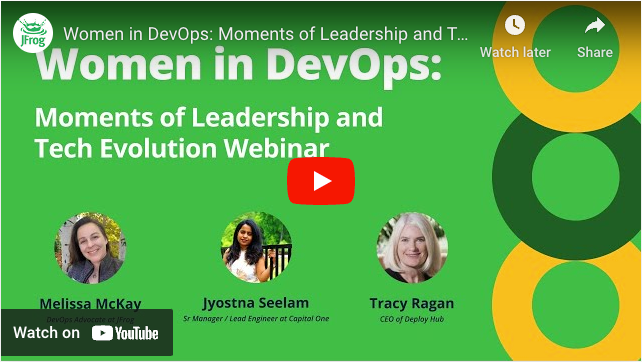Live Panel Recap: Women in DevOps
In celebration of International Women’s Day, I had the pleasure of speaking with two incredible female leaders in the software industry on our live panel session, “Women in DevOps: Moments of Leadership and Tech Evolution.” During the conversation with Jyostna Seelam, Senior Manager at Capital One, and Tracy Ragan, CEO of DeployHub, we discussed the role of women in DevOps and how they navigate growth and leadership, the impact of emerging technologies such as AI and machine learning on DevOps practices, and the influence of cloud-native technologies on the evolution of DevOps.
The event was a smash success, with 260 registrants, 117 live attendees, and a lively dialogue among all. In fact, some of my favorite moments came from the Q&A portion of the event where we answered attendee-submitted questions. In this blog, I’m excited to share five top takeaways. To see the entire panel session as it unfolded, you can watch the webinar here.
Watch the webinarTakeaway 1: Women bring unique skills and attributes to DevOps roles
The first question from the Q&A was around specific qualities women bring to DevOps roles and how those qualities can contribute to team success. We all agreed, grinning in our self-awareness, that characteristics such as multitasking, tidiness, and organization – qualities typically associated with women – can be uniquely beneficial in the DevOps environment.
Tracy observed that women tend to be “naturally tidier,” a skill that is an advantage in DevOps. “Being organized, being tidy, and being able to multitask are qualities of every person involved in DevOps that I have ever met,” she said.
Jyostna echoed Tracy’s sentiment, adding that women’s ability to multitask and their natural inclination to keep things organized are strengths that can be leveraged in DevOps practices. She also emphasized the importance of using the power of connection by joining networks and communities to stay on top of emerging technologies and developments in the field.
Bottom line:
Women bring unique and highly valuable skills to DevOps roles, such as expert multitasking and organization, which can contribute to both individual and team success.
Takeaway 2: AI and machine learning will greatly influence DevOps practices
The panelists also delved into the hot topic of how AI and machine learning will influence DevOps practices in the future. They recognized that although these technologies are still being learned and understood, they present great potential for automating mundane tasks and improving workflows.
Tracy suggested that the current stage of adoption we’re in could be called “applied AI,” where we’re just now learning how to use this new tool in our toolkit. For example, teams are beginning to figure out the best ways to use AI to do things like generate new workflows, improve existing ones, and how best to add the new tooling to DevOps workflows.
She also cautioned that widespread adoption of AI is going to come with a necessary cultural shift. “As developers, we’re so script-oriented and we’re going to have to shift away from that if we want to use AI to start generating code of any kind,” she said. “We have to start recognizing that AI is there to help us.”
When it comes to how AI is impacting the security side of things, Jyostna emphasized the value of AI in predictive analysis and its potential to help shift strategies to the left, thereby enabling proactive monitoring and early detection of issues. She encouraged embracing AI and other new technologies, and emphasized the importance of being hands-on in learning and applying them.
Bottom line:
AI and machine learning are becoming increasingly influential in our industry, with potential applications in predictive analysis, continuous security monitoring, automated code generation, and testing. We’re still in the early stages of learning best practices for leveraging these technologies, but if we want to continue driving forward an integration between DevOps and Security, we’re going to need to learn how these new technologies can help us to enable an ideal Dev+Sec+Ops workflow and then implement it.
Takeaway 3: Embrace change and continuous learning in the DevOps space
One of the key themes that wove throughout our conversation was the importance of embracing change and continuous learning. The panelists highlighted the rapid evolution of technologies and practices in the field and stressed the need for professionals to stay updated and adaptable.
Jyostna emphasized the importance of continuous learning and adapting to new technologies. “Challenge yourself to be hands-on when it comes to emerging technologies. Utilize the tools that are available to you… don’t hesitate or fear them.” As a broad example, she suggested that attendees not treat DevOps and DevSecOps as different or competing terminologies. “Just embed it in your culture,” she said.
Tracy also shared some interesting thoughts on how embracing cloud-native architecture can evolve DevOps. “The structure of the application itself isn’t changing. So if you’re really driving into digital transformation, you’re really starting to look at how to decouple a monolith.” Once you start adopting that decoupled architecture, she explains, you end up finding that you have multiple workflows and multiple containers that are being deployed independently. “Now you have feature-dependent deployments, and that changes everything.”
Tracy also highlighted the need to learn about Docker, Helm, and Kubernetes. “Getting Kubernetes certified is going to teach you a lot about today’s new digital world,” she said.
Bottom line:
The transition to a more fragmented and decoupled software environment presents new challenges in tracking changes and understanding the impact of updates. The adoption of cloud-native technologies, for instance, allows for improved scalability and flexibility in DevOps.
Takeaway 4: Mentorship is crucial for career advancement in DevOps
We all stressed the importance of mentorship for women in DevOps, both as a way of navigating challenges and advancing in our careers. We encouraged women to seek out mentors within their organizations and to use these relationships for guidance and support.
Jyostna highlighted the value of networking and joining communities, which can provide additional avenues for learning and development. “Networking opportunities,” she stated succinctly, “don’t miss them!”
“Find mentors within your organization… that’s somebody you can reach out to and you can feel free to talk to,” Tracy Ragan further advised. She explained that men tend to find mentors more frequently, but that this is something that needs to change.
I jumped into the conversation at this point, doubling down on the importance of mentorship. I’ve personally had mentors who have pushed me leaps and bounds forward in my career (shoutout to Randall, Ann, and Kirk – you know who you are – thank you!).
Bottom line:
There are numerous educational and professional development opportunities available for women looking to enter or advance in DevOps careers. Prioritize learning the basics of “the ops, the build, and the deploy” (i.e. learn Kubernetes, Docker, and Helm as a solid foundation). Last, but certainly not least, seek out trusted mentors.
Takeaway 5: Work-life balance is critical in DevOps roles
We also touched on the topic of work-life balance and its importance in DevOps roles. Tracy, Jyostna, and I fully acknowledged the challenges of maintaining balance but offered strategies for managing these challenges effectively.
Tracy suggested asking for help when needed. “I think that women in general are less likely to ask for help,” she said. She followed up by saying that people are often very willing to help and that asking for assistance can show initiative.
Jyostna agreed, adding that taking advantage of educational and professional development opportunities can also contribute to a better work-life balance, since many of today’s tools were originally created to help save developers’ time. We all heartily agreed on the value of leveraging available tools and resources to manage workloads and maintain balance.
Bottom line:
Don’t be afraid to ask for help and to find ways to outsource your work. Leverage the networks, tools, and other resources around you to offload some of the daily pressures. Especially with the growing trend of shift-left security, developers need to take advantage of time-saving tools like AI to maintain efficiency and productivity, all while nurturing a healthy work-life balance.








